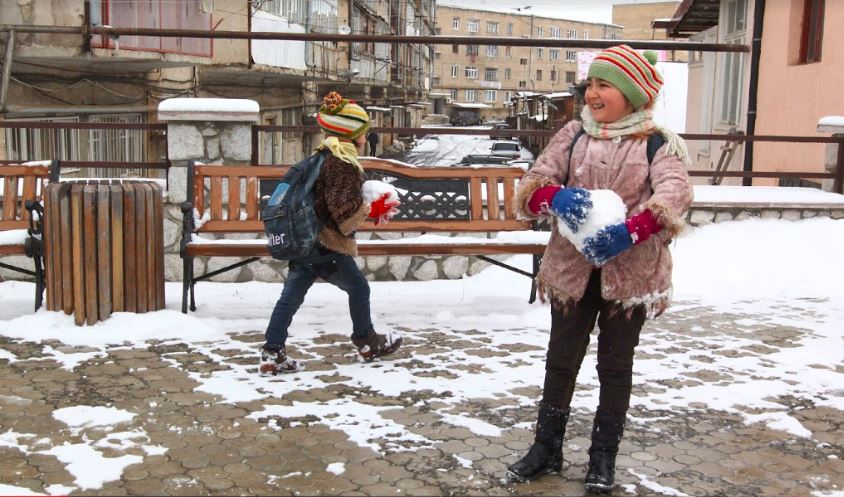
Analysis by Emil Sanamyan
Meeting in Paris on January 16, foreign ministers of Armenia and Azerbaijan Zohrab Mnatsakanyan and Elmar Mamedyarov, joined by mediators from France, Russia and the United States, issued a joint statement (reproduced below) that sounded more positive than any such pronouncement in many years.
In addition to agreeing on a follow-up ministerial in February and work towards a summit meeting between Armenian and Azerbaijani leaders – staple of the Karabakh diplomatic efforts over the past decade and a half – the two countries’ ministers expressed agreement “upon the necessity of taking concrete measures to prepare the populations for peace.” Additionally, “the Co-Chairs underlined the importance of possible mutually beneficial initiatives designed to fulfill the economic potential of the region.”
The notion of “preparing the populations for peace” rather than war has been repeatedly expressedby the mediators, particularly in response to increasingly militant rhetoric by Ilham Aliyev since the mid-2000s. This proposal coupled with the proposals for joint economic projects – in combination intended to build mutual trust and confidence – have for years been summarily dismissed by the Azerbaijani side, which instead insisted on unilateral Armenian territorial compromises.
While this statement appears to hint at a change in this position, it is notable that the parties only agreed to the “necessity” of such steps, rather than any concrete steps. It is further notable that “possible mutually beneficial initiatives” in economic sphere are being proposed by the co-chairs, rather than by Armenia and Azerbaijan.
In other words, it is far from apparent that Azerbaijani leadership is ready to step back from its policy of coercion against Armenia in favor of confidence-building and a true peace process. As the incumbent Azerbaijani leadership has made clear, they are ready to give the new Armenian leadership time – while continuing to maintain restraint on the frontlines as previously agreed with Serzh Sargsyan and toning down hostile rhetoric – in hopes that the Nikol Pashinyan government might consider compromises beyond those Sargsyan was ready to agree to. Pashinyan has given no indication that he is ready to do so and in fact his pronouncements on Karabakh have been much less conciliatory than Sargsyan’s.
More significantly, Azerbaijan could be entering a period of political turbulence, spurred in part by the revolutionary precedent in Armenia. A number of current and past Azerbaijani political prisoners and their supporters are now on hunger strike against their incarcerations and, more broadly, the Aliyev regime’s stifling of dissent. The campaign has been backed by the European Parliament and members of the U.S. Congress. Opposition groups, long shut out of formal politics, are planning street demonstrations. With no large-scale Azerbaijani protest movement for over a decade and public grievances mounting, a significant anti-regime campaign has been long overdue.
In this context, Aliyev may find an active peace process – including photo sessions with Pashinyan – to be helpful in terms of shoring up his position, both domestically and internationally. And for the new leader of Armenia, a period of frontline calm is also helpful, as Pashinyan finds his way through the many corridors and capillaries of power.
Thus a positive spin on the peace process, even as principal disagreements remain, has advantages for both Armenia and Azerbaijan.
Press Statement by the Co-Chairs of the OSCE Minsk Group
PARIS, 16 January 2019 – The Co-Chairs of the OSCE Minsk Group (Igor Popov of the Russian Federation, Stéphane Visconti of France and Andrew Schofer of the United States of America) hosted consultations between Foreign Minister of Azerbaijan Elmar Mammadyarov and Acting Foreign Minister of Armenia Zohrab Mnatsakanyan on 16 January in Paris. The Co-Chairs met separately and then jointly with the Ministers. Personal Representative of the OSCE Chairperson-in-Office Andrzej Kasprzyk also participated in these meetings. This was the fourth meeting of the two Ministers.
State Secretary for Europe and Foreign Affairs of France Jean-Baptiste Lemoyne reviewed the outcomes of the talks with the participants. The Co-Chairs were received at the Elysée Palace, where they briefed top diplomatic advisers of President Emmanuel Macron.
The participants expressed to the Ministers their appreciation for the ongoing efforts of the sides to maintain an environment conducive to intensive results-oriented negotiations.
The Ministers discussed a wide range of issues related to the settlement of the Nagorno-Karabakh conflict and agreed upon the necessity of taking concrete measures to prepare the populations for peace.
During the meetings, the Co-Chairs reviewed with the Ministers key principles and parameters for the current phase of the negotiation process.
The Ministers and the Co-Chairs considered next steps toward a possible summit between the leaders of Azerbaijan and Armenia in order to give a strong impulse to the dynamic of negotiations.
The Co-Chairs underlined the importance of possible mutually beneficial initiatives designed to fulfill the economic potential of the region.
The Co-Chairs plan to meet the leaders of the two countries in the near future.









